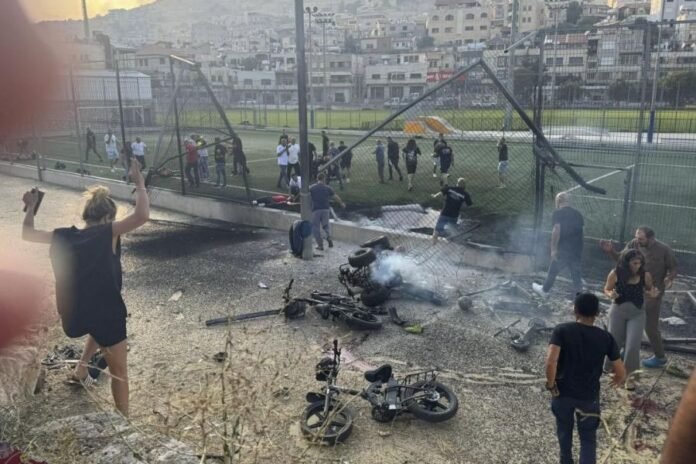The Israeli military claimed that Sunday’s rocket attack on a soccer field in the Israeli-controlled Golan Heights, which killed 12 children and teenagers and was the bloodiest attack on civilians since October 7, had left the Middle East on tenterhooks. The missile came from Lebanon, according to authorities in Israel.
Hezbollah, who denied involvement in the bombing, and Israel were suspected of waging a wider regional conflict as a result of the strike. The Israeli military claimed to have attacked many locations inside Lebanon during the course of the night, while the strikes’ intensity was comparable to that of months of cross-border fighting between Israel and Hezbollah.
About 12 kilometers south of Lebanon, near the Syrian border, sits the Druze hamlet of Majdal Shams. On Saturday, shortly before nightfall, a rocket crashed into a soccer ground where hundreds of kids and teenagers were playing. The Israeli military reported that 20 children were injured and 12 youngsters between the ages of 10 and twenty were killed.
As rescuers gathered charred bicycles and backpacks, the field was littered with shrapnel and blood spatters. Residents started erecting hundreds of chairs for a huge memorial on the field where the attack occurred during the course of the night. Tens of thousands of people were anticipated to assemble, and locals informed Israeli media that this was the only location in the town large enough to accommodate them.
Many of the victims were taken to a Majdal Shams community center on Sunday morning, where family members wept over the caskets. The coffins, which were lined up for burial at midday and covered in white fabric with pictures of the victims on them, were taken to the cemetery and went past a throng of thousands of people. According to locals, one 11-year-old child is still missing.
In the 1967 Mideast War, Israel defeated Syria for control of the Golan, a strategically important plateau that overlooks northern Israel. In 1981, Israel annexed the Golan. Several nations view the region as occupied territory.
Since the conflict began in October, strikes on the Israel-Lebanon border have simmered just below the boiling point of full-scale warfare. However, given the attack’s high death toll and the victims’ young ages, Israel might have to take more drastic measures.
The day after Hamas attacked on October 7, Iran-backed Hezbollah started launching rockets at Israel. In response, Israel launched airstrikes and used drones to target what it claims is Hezbollah military equipment. The majority of the assaults have only targeted the region on either side of the border, while Israel has also killed leaders of Hamas and Hezbollah in Lebanon, which is further north. Tens of thousands of people on both sides of the border have fled their homes.
Over 500 people have been killed in Israeli airstrikes in Lebanon since early October, the majority of whom were members of Hezbollah but also over 90 civilians. There have been 24 civilian deaths and 22 military deaths on the Israeli side.
While in the United States at the time of the incident, Israeli Prime Minister Benjamin Netanyahu issued a warning, stating that Hezbollah “will pay a heavy price for this attack, one that it has not paid so far.”
During a meeting with Majdal Shams leaders on Saturday night, Chief of Staff of the Israeli military Lt. Gen. Herzi Halevi stated that Israel was getting ready for “the next stage of fighting” in the north.
Hezbollah, in an uncommon move, denied assuming responsibility for the attack, although Halevi claimed the missile was a Hezbollah-owned Falaq rocket carrying a 53-kilogram warhead.
Also Read: Pakistan committing collective suicide with Kashmir jihad obsession
US intelligence authorities are reportedly confident that Hezbollah carried out the strike on the Golan Heights, but it was unclear if the terrorist group intended to hit the target or misfired. The government of Lebanon called for a “immediate cessation of hostilities on all fronts” and denounced all attacks on civilians in a statement that omitted any mention of Majdal Shams.
Iran issued a warning to Israel on Sunday, stating that “unprecedented consequences” will follow a forceful response to the Golan Heights strike.



